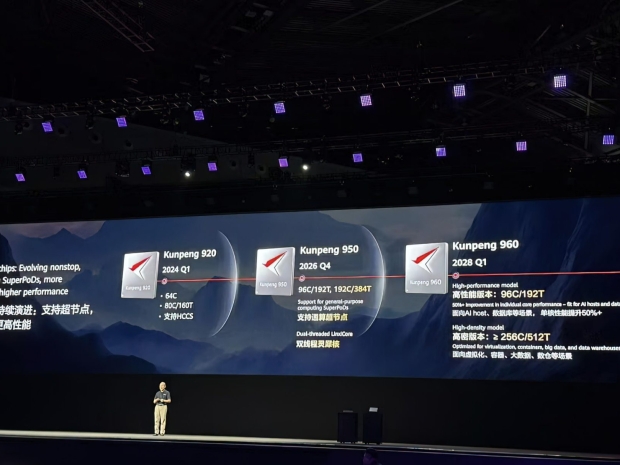The Kungpeng 950 series will be the first stop, arriving in the last quarter of 2026. Two main variants are planned: a 96-core, 192-thread part aimed at high-performance workloads, and a 192-core, 384-thread density chip designed for massive parallel computing.
Huawei says this represents a 50 per cent uplift for the performance and a 2.4 times jump for the density version compared with its current line-up. Both will rely on the company’s dual-threaded Unix-Core architecture and are being pitched as fully compatible with its next generation of SuperPods.
The real bragging rights come with the Kungpeng 960 series, which Huawei claims will be ready by the first quarter of 2028. These will range from a 96-core, 192-thread high-performance CPU to a density part packing more than 256 cores and 512 threads.
The outfit is promising 50 per cent more performance per core than the 950 series, and the chips are targeted at AI hosting, big databases, containerised environments, and sprawling virtualisation projects.
Huawei is tying the CPUs to its expanding SuperPod hardware. The Atlas 950 SuperPod is slated to feature 8,192 Ascend 950 accelerators, with up to 8 exaflops of FP8 performance, 1,152 TB of memory, and a claimed bandwidth of 16.3 PB/s. The outfit reckons that will translate to 4.91 million training transactions per second and 19.6 million inference transactions per second.
The Atlas 960 SuperPod is due to take things even further with 15,488 Ascend 960 and 950DT accelerators, with up to 30 exaflops of FP8 compute and 60 exaflops of FP4 compute. Huawei has thrown out a headline bandwidth number of 434 PB/s, which, if true, would put the thing well beyond anything currently operating.
Huawei showed off the TaiShan 950 SuperNode, a cluster setup that can hold 32 Kungpeng 950 CPUs across 16 nodes with a maximum of 48 TB of memory. These nodes are meant to slot directly into larger SuperPod clusters, which Huawei says will eventually scale to half a million or even a million accelerators linked together in what amounts to AI super-factories.
The Chinese authorities have been pressing hard for data centres to cut reliance on foreign silicon, creating an urgent need for local suppliers to scale production and performance. Huawei is clearly positioning its Kungpeng CPUs and Ascend accelerators as the domestic answer, with performance numbers that sound designed as much for political reassurance as for technical specification sheets.




